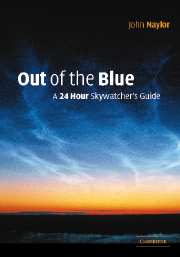Book contents
- Frontmatter
- Contents
- Preface
- Introduction
- 1 Daylight
- 2 Shadows
- 3 Mirages
- 4 Sunset and sunrise
- 5 Rainbows
- 6 Coronae and glories
- 7 Atmospheric halos
- 8 The night sky
- 9 The Moon
- 10 Eclipses
- 11 Planets
- 12 Stars
- 13 Comets and meteors
- APPENDIX: Technical and practical advice for skygazing
- Glossary
- Further reading
- Sources and notes
- Index
- Frontmatter
- Contents
- Preface
- Introduction
- 1 Daylight
- 2 Shadows
- 3 Mirages
- 4 Sunset and sunrise
- 5 Rainbows
- 6 Coronae and glories
- 7 Atmospheric halos
- 8 The night sky
- 9 The Moon
- 10 Eclipses
- 11 Planets
- 12 Stars
- 13 Comets and meteors
- APPENDIX: Technical and practical advice for skygazing
- Glossary
- Further reading
- Sources and notes
- Index
Summary
That comets are capable of destroying such worlds as may chance to fall in their way, is, from their vast magnitude, velocity, firey substance, not at all to be doubted, and it is more than probable from the great and unoccupied distance betwixt ye planet Mars and Jupiter some world may have met with such a final dissolution.
Thomas Wright, Second or Singular Thoughts upon the Theory of the Universe, ed. M. Hoskins, Dawsons of Pall Mall, London 1968, p. 42Comets
There is a long association between comets and disastrous events on Earth. Over the ages, they have been variously blamed for floods, droughts and pestilence. As far as the ancients were able to tell, comets appear unpredictably, seemingly from nowhere, and after a few weeks vanish, never to be seen again. They were seen as a challenge to the harmony and predictability that normally reigns in the skies, and were excluded from the heavens on the authority of Aristotle. He argued that the fact that comets appear and disappear without warning, means that they must be due to events close to the Earth, the only part of the universe where he believed change was possible. According to Aristotle, comets were atmospheric phenomena involving friction between layers of the atmosphere furthest from Earth.
- Type
- Chapter
- Information
- Out of the BlueA 24-Hour Skywatcher's Guide, pp. 282 - 299Publisher: Cambridge University PressPrint publication year: 2002



